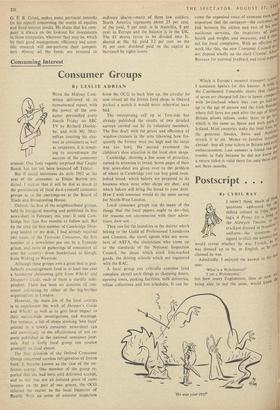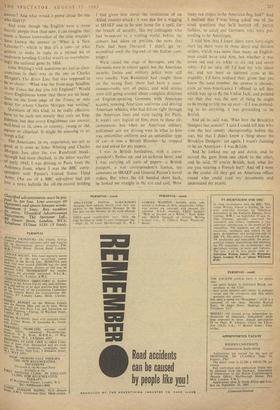Postscript . . .
By CYRIL RAY
DIDN'T think much of Iti°91,,
questions addressed bY
militia colonel in John bi tng's A Penny for a Song. 3 the Aldwych Theatre, to tile,. crackpot dressed in Nap0le°4r" uniform—the questions '41 signed to elicit the answers Ih3 whether he was French, as be he a°4
firsi
'What is a Wykehamist7'
'I am a Wykehamist,' 001 but how many Englishmen, then or aclvi, the being able to say the same, would kn°w
would reveal was dressed up to be, or English, as claimed he was.
Admittedly, I enjoyed the answer to one:
the
answer? And what would it prove about the one who didn't?
And even though the English were a more bucolic people then than now, I can imagine that , many a Sussex ironworker of the time wouldn't have known the answer to `What is a New Leicester?'—which is that its a cow—or what gesture to make in reply to a mimed bit of ocletarm bowling. Cricket wasn't so overwhelm- tngly the national game by 1804. John Whiting's trick questions are just as class- conscious in their way as the one in Charles Morgan's The River Line that was supposed to ,be so clever:. 'What was the front-page headline In the Times the day you left England?' Would ever)" Englishman know that there are no head- lines on the front page of the Times, or only those for whom Charles Morgan was writing? Questions of this kind, to be really effective, have to be such not merely that only an Eng- lishman, but that every Englishman can answer, Well-bred or ill, town or country, young or old, square or elliptical. It might be amusing to at- tempt a list.
The Americans, in my experience, are not as t°0d at it even as John Whiting and Charles :7 Morgan. Just- after the von Rundstedt break- through had been checked, in the bitter weather of early 1945, I was driving to Paris from the Ardennes front, where I was the BBC corre- spondent with Patton's United States Third Arm‘,, , (An ass of a BBC sub-editor had put into a news bulletin the off-the-record briefing I had given him about the imminence of an Allied counter-attack: I was due for ‘a. wigging at SHAEF and to be sent home for a spell, for the breach of security, like my colleagues who had broadcast to a waiting world, before the censors had taken up position, the. news that Paris had been liberated. I didn't get re- accredited until the fag-end of the Italian cam- paign.) We'd raised the siege of Bastogne, and the Germans were in retreat again, but the American security forces and military police were still very touchy. Von Rundstedt had caught them on the wrong foot; there had been a nous- sommes-trahis sort of panic; and wild stories were still going around about complete divisions .of English-speaking Germans; with American accents, wearing American uniforms and driving American vehicles, who had driven right through the American lines and were racing for Paris. It wasn't very logical of him, even in those cir- cumstances, but when an American military policeman saw rue driving west in what to him was unfamiliar uniform and art unfamiliar type of car—it was a British Humber—he stopped me and asked for my papers.
I was in British battledress, with a corre- spondent's flashes up, and an airborne beret, and I was carrying all sorts of papers—a British passport, a war correspondent's licence, my summons to SHAEF and General Patton's travel orders. But when the GI handed them back, he looked me straight in the eye and said, 'How many red stripes in the American flag, bud?' And I realised that I was being asked one of the stock questions that he'd learned off, parrot fashion, to catch out Germans 11 Ito were pre- tending to be Americans.
I told him .that. I knew there were forty-eight stars (as there were in those days) and thirteen stripes, which was more than many an English- man could have told him, but whether it was seven red and six white or six red and seven white—rd no idea. (If I'd had my wits about me, and not been so damned cross at his stupidity, I'd have realised that, given that you know the total number, the answer is obvious, even to non-Americans.) I offered to tell him which way up to fly the Union Jack, and pointed out that that was. the sort of thing he ought to be trying to trip me up over—if I was pretend- ing to be anything, I was pretending to be British.
And all he said was, 'Who beat the Brooklyn Dodgers last season?' I said I could tell him who won the last county championship before the war, but that I didn't know a thing about the Brooklyn Dodgers: yet again, I wasn't claiming to be an American- I was British.
And he looked me up and down, and he moved the gum from one cheek to the other, and he said, 'If you're British, bud, what for are you wearing a French hat?' And off I went to the cooler till they got an American officer round who could read my documents and understand my accent.































 Previous page
Previous page